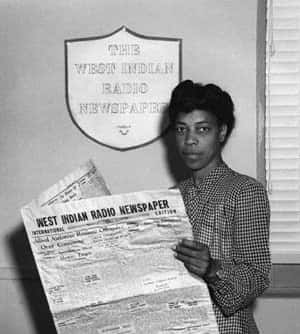Una Maud Marson: Google Doodle honors Jamaican feminist poet who won against racism

Google on October 10 dedicated its Doodle to Una Maud Marson, considered one of the most versatile female intellectuals in Jamaica’s literary heritage. The Doodle has been illustrated by UK-based artist Sarah Madden. Marson was one of Jamaica's most influential feminist thinkers and was a writer, advocate and broadcaster. Marson was the first Black woman who was employed as a radio producer at the BBC, where she is known to have recorded various important interviews, a very significant of them being one with swing band icon Ken 'Snakehips' Johnson — which took place in 1940 on this day.
Marson, born on February 6, 1905, at Sharon Mission House, Sharon village, near Santa Cruz, Jamaica, was the youngest of six children of Rev Solomon Isaac Marson and Ada Wilhelmina Mullins. Growing up, she was appointed assistant editor of the Jamaican political journal Jamaica Critic, where she learned journalism that inspired her to create her own publication. In 1928, Marson established The Cosmopolitan, becoming Jamaica’s first woman magazine publisher and editor. Her publication focused on social injustice and gender issues.
RELATED ARTICLES
Michiyo Tsujimura: Google Doodle celebrates Japanese scientist on her 133rd birthday
Ildaura Murillo-Rohde: Google Doodle honors legendary Panamanian-American nurse
Drawing inspiration from London’s political and literary climate, Marson moved to the city in 1933. Facing rampant racism there, she began fighting for equal rights alongside fellow Caribbean immigrant Dr Harold Moody. Moody was the founder of civil rights group The League of Coloured Peoples.
In 1938, Marson took a position at BBC, and her career flourished as she worked with George Orwell and read her own poetry while TS Eliot sat with her. She also produced the renowned weekly program 'Calling the West Indies'. The program, first broadcast in 1943, featured poems and short stories by Caribbean authors. It gave a voice to various writers, including Samuel Selvon, and highlighted a woman's perspective to the mainly male-dominated Black Internationalist Movement.

Marson's poetry has been both praised and dismissed by critics. Some praised her for her modern style, and some suggested that her mimicry of European style, such as Romantic and Georgian poetics, challenged conventional poetry of the time. Some critics, on the other hand, criticized her for the same. Despite the criticism, however, Marson was very active in the West Indian writing community. Although all her literary contributions, and her life as a whole, may not be very widely known, Marson's poetry is what has broadened her legacy which future generations continue to discover. Her achievements were celebrated back in 2009 with an installation of a Blue Plaque — which honors people who have greatly influenced their community and beyond — at her former home in London’s Brunswick Park. Marson died aged 60 in 1965, following a heart attack.










